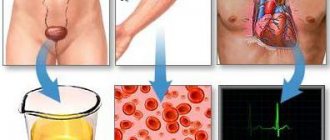The material for the study is blood taken from a vein.
A comprehensive analysis includes the determination of several infections of the male genitourinary system, which include:
- Chlamydia.
- Ureaplasmosis.
- Mycoplasmosis.
- Trichomoniasis.
- Gonorrhea.
- Syphilis.
- Herpes virus infection.
- Human papillomavirus.
- Candidiasis (fungal infection).
If necessary, it may additionally include the determination of antibodies in the blood to the human immunodeficiency virus (HIV), as well as pathogens of viral hepatitis with parenteral transmission (viral hepatitis B, C).
Tests for latent infections in men are carried out in the presence of a clinical picture or as a preventive measure.
Hidden infections are found everywhere.
To ensure their absence, men need to undergo regular testing for hidden infections.
The patient's biological fluids are examined for the presence of pathogenic microorganisms that cause infections.
How to get tested for hidden infections correctly
To detect infections, it is possible to use different biomaterials.
Typically used:
- Blood;
- Sperm;
- I'm peeing.
Blood is drawn in a laboratory.
To do this, just come to the medical facility in the morning.
You should not eat food before the test.
Urine collection is done in the morning, preferably on an empty stomach.
The patient must submit urine to a laboratory.
Eating affects the acid-base balance of urine, so the material is collected on an empty stomach.
It is not recommended to wash your genitals with antibacterial soap before urinating.
The day before, you should not take antibiotics or use disinfectant solutions to treat the external genitalia.
This significantly distorts the picture of the study.
The day before the test you should not have sexual intercourse.
Urine is collected in a sterile container.
When delivered to the laboratory, urine should not be exposed to significant physicochemical factors.
They can change the chemical structure of urine or have an inhibitory effect on potential infectious agents.
What tests need to be done
Most often tests are taken for:
- candida fungus;
- genital viruses;
- papillomavirus, herpes virus, cytomegalovirus infections.
Tests are also carried out for chlamydia, mycoplasmosis, ureoplasmosis, and staphylococcal infections.
Some problems require other tests to be performed.
This:
- Detection of parasitic infestation;
- The need for sperm testing;
- Bacterial resistant infections.
Let's take a closer look: there are direct types of research on protozoan eggs.
Feces are biological material that allows us to determine the presence of internal parasitic microorganisms.
They take an enzyme immunoassay of seminal fluid. This type of test indicates whether there is an inflammatory response in the body, but does not provide information about the specific type of infection.
Bacteriological culture is the placement of the patient’s biological material in an environment favorable for a potential infectious agent, the growth of which indicates the presence of the disease.
The immunofluorescence reaction is the exposure of urethral smear material to reagents that allow the detection of viruses, bacteria and fungi.
PCR. This analysis is a type of enzymatic action that determines the DNA and RNA structure of infectious agents, specifying their type and quantity in the material being studied. One of the most accurate analyses. The analysis will be more successful if the patient exposes himself to a provocation method: creating conditions that provoke an exacerbation of a potential infection. This is a nutritional or medicinal provocation
What infections can be detected using PCR diagnostics?
Taking into account the entire spectrum of pathogens, PCR diagnostics in modern medicine is used in urology, gynecology, dermatovenereology, gastroenterology and many other branches of medicine.
Currently, PCR diagnostics of latent infections allows us to identify the following diseases:
1) HIV infection
2) Viral hepatitis A, B, C, G, E
3) Infectious mononucleosis (Epstein-Barr virus DNA - EBV)
4) Cytomegalovirus infection
5) Herpetic infection
6) STIs (sexually transmitted infections) – ureaplasmosis, gardnerellosis, chlamydia, mycoplasmosis, trichomoniasis, mycoplasmosis, candidiasis (Thrush)
7) Tuberculosis


9) Borreliosis, tick-borne encephalitis
10) Listeriosis
11) Candidiasis
12) Helicobacter pylori infection
and many others
Tests when a couple is planning a pregnancy
To prevent the future fetus from contracting an infection and to exclude possible complications during pregnancy, before intercourse, the man is tested for the presence of hidden infections.
When the result is positive, pregnancy planning should be postponed.
Both partners need to take a Rh compatibility test to prevent a possible Rh conflict, which can be fatal to the fetus.
It is advisable to take a spermogram.
It will show the concentration of sperm, their mobility and structure.
A man needs to have his prostate secretions examined.
A smear is taken from the urethra and a bacteriological culture is performed, which will reveal the presence of bacteria that provoke inflammation of the prostate gland.
A general urine test will indicate the presence of inflammatory processes in the genitourinary system - this is the presence of leukocytes in the urine.
If the level of salt in it is increased, this indicates a high risk of urolithiasis.
A biochemical blood test reveals problems with the gastrointestinal tract and the presence of diabetes mellitus
A mandatory item is a general blood test.
If the level of leukocytes increases, the level of hemoglobin decreases, or the presence of specific antibodies, treatment is carried out.
In the case of a blood clotting disorder or an increase in platelets, planning should be postponed until the cause of the above symptoms is determined.
It is necessary to conduct a blood test for HIV, AIDS diseases, syphilis (RW test). Test for hepatitis B (HbSAg test) and hepatitis C (HCV).
The man is prescribed fluorography.
At least 3 months before conception, both parents should receive genetic counseling to determine whether either of them is a carrier of severe genetic mutations.
This includes a cytogenetic study to determine the quality and quantity of chromosomes.
Spermogram, which determines the quality of sperm composition.
HLA typing will show the level of tissue compatibility.
If there is a possibility of infertility, this test is prescribed.
Screening for lipid profile and uric acid in the blood
This set of studies must be performed at least once a year, starting at age 30. The study allows you to find out the status of fat metabolism with your usual diet, identify its risks to your health and the formed signs of metabolic disorders leading to cardiovascular diseases.
This study is rightfully considered one of the most important for men, since consumption of fatty foods, alcohol and smoking leads to impaired fat metabolism with the formation of metabolic syndrome. These factors are the main causes of the development of diabetes mellitus, obesity, atherosclerosis, and liver diseases, which today are rapidly “getting younger” and remain asymptomatic for a long time.
Screening will show the level of “bad” and “good” cholesterol, based on which the doctor can not only assess predisposition to diseases, but also give recommendations on lifestyle and nutrition, physical activity - simple rules that prolong life by years if heard in time and applied.

Tests before hospitalization
These are tests that show whether the patient has dangerous infections.
The usual list of studies is as follows:
- Tuberculosis, hepatitis (HRsAg and HCV antibodies)
- AST and ALT
- Conclusion from an infectious disease specialist, if necessary.
- Influenza, Pseudomonas aeruginosa, HIV, syphilis.
- Fluorography: to refute tuberculosis.
- Bacteriological culture of smears from the nasal pharynx for staphylococcus.
- The patient must also undergo an ECG and ultrasound.
- Take a general urine and stool test.
- Coagulogram.
- If necessary, additional hormone tests are prescribed.
- Biochemical blood test for AST and SLT.
- Consultation with an ENT doctor, if necessary.
- Analysis to determine blood group and Rh factor.
What to do if you receive a positive test: smears and blood
In this case, a range of additional studies are prescribed with the consultation of specialized doctors.
For example, a tank culture is performed to determine the concentration of microorganisms and antibiotic therapy is prescribed.
If cellular changes are detected during a urethral smear, a biopsy is taken to determine malignancy.
If the PCR analysis gives a + result, especially after sexual intercourse, a test is carried out for HIV and syphilis, cytomegalovirus infection.
It is necessary to carry out an immunogram using the ELISA method, which specifies the type of pathogen.
Symptoms of infectious diseases in men
In the acute period, STIs are manifested by the following symptoms:
- itching, burning in the urethral area;
- rash in the groin;
- pathological discharge from the urethra;
- difficulty urinating;
- nagging pain in the suprapubic region;
- decreased potency;
- difficulty achieving orgasm;
- premature ejaculation.
However, in practice, men rarely encounter clear symptoms of latent infections. STIs have a long incubation period during which there are no clinical manifestations. The immune system suppresses the active reproduction of the pathogen, as a result of which the disease immediately becomes chronic.
If you have any questions, call us at: +7 Medical administrators are always ready to advise you.
Blood test for infections
Types of analysis:
- ELISA - detection of immunoglobulin proteins in blood serum.
- PCR analysis detects remnants of the cell walls of bacteria and viruses.
- Leukocytes and ESR - their level indicates the presence of an inflammatory process.
Oral swabs to detect infections
This method is used to find streptococcal and staphylococcal pathogens, fungal infections (oral candidiasis).
Bacteria living on the surface of the tonsils are often detected.
These microorganisms provoke the development of rheumatism and heart defects, and give complications to the kidneys.
Therefore, it is important to identify them in time and treat them.
On the eve of this test, it is recommended to refrain from eating for 2-3 hours. You should not take antibiotics in tablets or sprays.
Nasal swab
It is carried out to determine staphylococcus and streptococcus, diseases of fungal and viral etiology.
There is a specialized test for diphtheria of the nasal cavity.
It is taken with a special sterile swab and immersed in a test tube with a nutrient medium.
On the eve of the study, you should not use antimicrobial ointments or nasal drops. You should not rinse your nasal cavity on the day of the test.
Urethral swab
Helps detect gram-negative bacteria, chlamydia, ureoplasmosis, gonorrhea, staphylococcus.
Bacteria living in the urinary tract and causing bacterial infections must be identified in a timely manner.
The day before, you should not use antimicrobial urological sprays or take antibiotics.
You should not have sexual intercourse a few days before the test.
Anal swab
Conducted to detect protozoan eggs, intestinal staphylococcus, diphtheria, and to find traces of typhoid fever.
Salmonellosis, chlamydia, and fungal infections of the intestines are often detected.
The basis of this method is placing the biological material of the smear in an environment favorable for the development of bacteria (Petri dish).
It is placed in a thermostat for several days.
Then the culture is analyzed for the growth of bacterial flora.
Determine its type and quantity.
Semen analysis for infections
Carried out to detect viral, fungal and bacterial diseases.
The material used is sperm and prostate juice.
PCR diagnostic tests
PCR is one of the most accurate ways to detect infection.
It determines not the individual reaction of the body to the infectious process, but the presence of DNA.
Serological techniques
This analysis indicates the amount of antibodies in the blood serum, gives a picture of the course of the disease and the person’s immune status.
It is more accurate than a smear if a person does not have immune dysfunction.
It is not always possible to isolate a culture using bacteriological culture.
This is greatly influenced by external conditions. The method provides a complete description of the course of the disease and the degree of immune resistance.
However, if the patient has problems with immunity, antibodies cannot always be detected.
Testing for infections by culture
They are carried out if the overall clinical picture shows symptoms characteristic of some bacterial disease.
To confirm or refute the alleged diagnosis, the doctor takes a flora culture test from the required area of the body.
Usually this is the nasal, oral cavity, seeding from the ear canal, urethra or anus.
The essence of the analysis: collection of the patient’s biomaterial on a sterile swab placed in a nutrient medium.
It promotes the growth of microorganisms.
The analysis is carried out over several days.
On the eve of the analysis, taking antibacterial agents is contraindicated.
What tests should a man undergo for HPV?
HPV (human papillomavirus) is the causative agent of a chronic infectious process.
It is accompanied by the formation of characteristic benign tumor formations (papillomas).
Some types of this virus significantly increase the risk of papilloma degenerating into cancer.
Therefore, the type of virus is diagnosed using PCR, for which the man takes a smear from the urethra.
What tests are done for prostatitis in men?
Prostatitis is an inflammation of the prostate gland in men, which is a common complication of sexually transmitted infections.
If the development of prostatitis is suspected, the doctor prescribes a comprehensive laboratory test for sexually transmitted infections.
The examination includes a spermogram (laboratory test of sperm) if the man plans to have children in the near future.
Why are urogenital infections dangerous?
As the name itself suggests, these infections affect the human genitourinary system, that is, the inflammatory process is initially concentrated in the organs and structures of the urogenital tract, although later, if left untreated, it can affect other parts.
There is a lot of debate about who is more dangerous from genitourinary infections - women or men. Thus, women are more susceptible to contracting urogenital infections due to the characteristics of female physiology. While in men, some dangerous STIs occur without any symptoms, which significantly delays the detection and treatment of the disease.
There are no “winners” in this dispute and there cannot be. Infectious diseases of the genitourinary area can lead to chronic inflammatory processes; cause erectile dysfunction, prostatitis and infertility in men, inability to become pregnant (female infertility) or bear a child to term in women; cause damage to the nervous and immune systems, kidneys, liver, spinal cord and brain; lead to the formation of malignant tumors.





